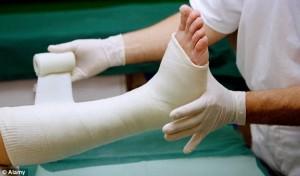 You’re jogging through a park in Berlin when suddenly, you trip over a rock and twist your ankle. As you lay in pain, uncertain of the severity of your injury, your mind begins to race. What should you do?
You’re jogging through a park in Berlin when suddenly, you trip over a rock and twist your ankle. As you lay in pain, uncertain of the severity of your injury, your mind begins to race. What should you do?
Whenever we plan for vacation, the thought of an emergency situation occurring (such as the one above) rarely crosses our minds.
However, injuries and illnesses are just as likely to occur when you’re on the other side of the world as they are when you’re a block away from your house. The best way to handle these emergency situations? Be as prepared as possible before you go.
Prior to your departure, be sure to research medical facilities and doctors in the area where you’ll be staying. Fortunately, there are helpful resources available to travelers all over the world. The International Society of Travel Medicine, for example, maintains a directory of health care professionals in almost 50 countries around the world. The International Association for Medical Assistance to Travelers includes similar information, as well as details about hospitals and clinics that can provide medical care to travelers.
You might want to subscribe to mPassport as well, which provides travelers with helpful information such as access to a profiled network of English-speaking physicians in over 180 countries, and translation services for drug names and other medical phrases.
Additionally, you can check with your country’s embassy for more information. Be sure to write down the embassy contact information for the country you’re visiting in case you experience an emergency when abroad.
Finally, you should review your domestic health insurance plan to see if and how much you’ll be covered for if you experience a medical emergency when abroad. Some plans may reimburse you for limited medical expenses, but it’s good to double-check before you assume. If your health plan is too limited, you should consider purchasing supplemental travel health insurance. This is an important consideration for those who have a preexisting medical condition (such as diabetes) or if you are pregnant.
These plans can be purchased for the duration of your trip and can cover things such as medical expenses, emergency medical transportation, and medical evacuation (in case you need to be transported to a place with higher quality care). They can also help you pay hospital bills, provide you with 24-hour support centers, and more. GeoBlue Travel Health Insurance, for example, offers services such as emergency medical evacuation coverage, coverage for pre-existing conductions, prescription drug reimbursement, and more. Since every travel health insurance plan is different, make sure you understand and compare each one to ensure you select the one that meets your (anticipated) needs.
What Should You Do if Injured or Sick?
If you’re injured, be sure to clean any wound to lower the risk of infection. If so, you’ll want to see a doctor right away. If you purchased travel health insurance, contact them immediately, as they will be able to advise you during this time. If not, contact your local embassy or consulate if you need assistance.
Photo from The Daily Mail.


